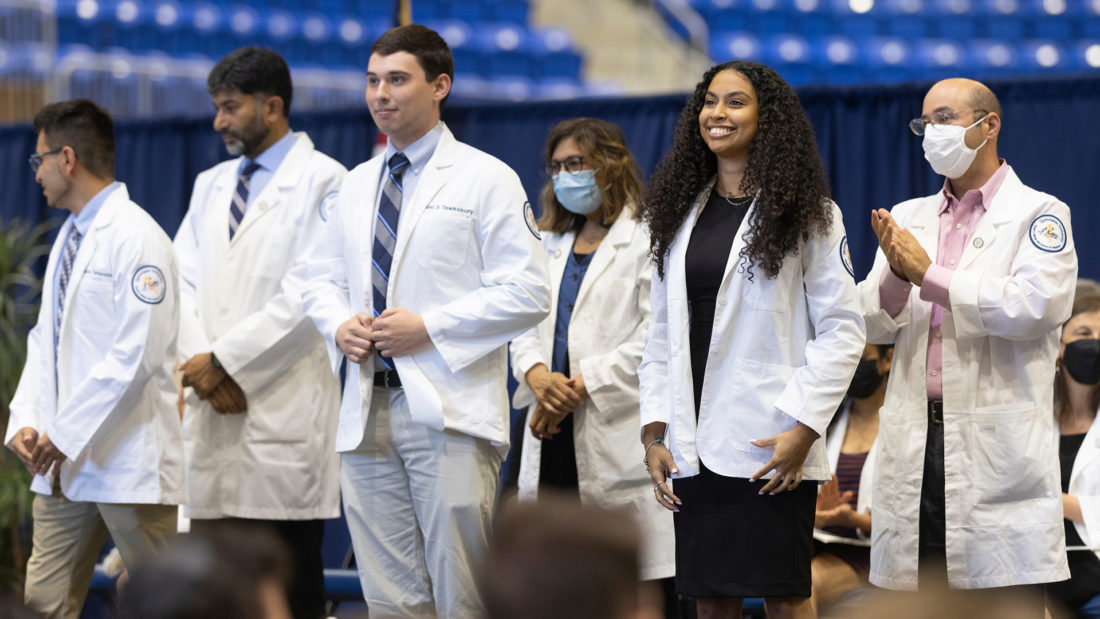Before being cloaked in crisp white coats and handed gleaming stethoscopes, a trailblazing class of Quinnipiac University medical students announced themselves as the next generation of compassionate physicians on Thursday, Aug. 4 at the People’s United Center.
In a new ritual at the Frank H. Netter MD School of Medicine, all 94 members of the Class of 2026 stepped up to a lectern and stated their name and hometown, eliciting cheers from family and friends gathered to witness the traditional White Coat Ceremony.
Heralding the first-year students’ arrival is some groundbreaking data: 26% come from ethnic backgrounds considered underrepresented in the medical community, 23% are first-generation college graduates and six served in the military. The students — who hail from 24 states — were selected from a pool of about 7,400 applicants.
Dr. Joyce Sackey, associate provost and chief diversity officer for Tufts University Health Sciences Schools in Boston, delivered the keynote address. A native of Ghana who also serves as the dean for multicultural affairs and global health and is an associate professor of medicine at Tufts, Dr. Sackey urged the students to occupy “the driver’s seat as learners.”
“Don’t be afraid to speak up and seek opportunities that enhance — through the core curriculum and also extracurricular offerings — the knowledge you feel you need in order to take care of the kind of patients you’re imagining you’ll be providing care for,” she said.
Dr. Sackey’s speech also noted the need for each physician to serve as a “bridge-builder” to “communities that have been disenfranchised” amid these turbulent times for the healthcare industry.
“The white coat that you’re holding in your lap, when it gets soiled you can take it to the laundry and it will get clean again,” Dr. Sackey said. “Your integrity, on the other hand, is very difficult to rebuild once you’ve broken it.”
Dr. Sackey was introduced by Dr. Phillip Boiselle, the medical school’s dean, who stressed the importance of adopting the traits with which every “humanistic healthcare professional” must be equipped.
Coats and instruments are universal symbols. But just as important are the tenets of CARES, Dr. Boiselle said, referring to the acronym created by the Gold Foundation when it established the White Coat Ceremony more than three decades ago. It stands for collaboration and compassion, altruism, respect and resilience, empathy and service.
“To our students, as you put on your white coats for the first time today — and each day forward — remember to cloak yourselves in these CARES attributes and to intentionally embody them through your words and actions with your patients, your peers, and the communities in which you serve,” Dr. Boiselle said.
“The overarching purpose of our university is to prepare graduates for careers of tomorrow, and as enlightened global citizens,” added Quinnipiac President Judy Olian. She noted the Netter School’s uniqueness in housing every medical discipline in one facility, creating an environment that promotes “interdisciplinary exchange and collaboration.”
“You’ll be learning to be future doctors in an environment that reflects how our healthcare system operates today,” she said. “You’re being trained together, to work as integrated teams delivering the best patient care, and advancing healthcare access and equity.”
Following Dr. Sackey’s remarks was a speech from fourth-year student Janani Arangan, who further underscored the significance of humanism in medicine. She related the story of when her Indian-born father arrived in the U.S. to study medicine, a journey that began with a kind stranger offering a late-night ride from the airport and a place to sleep.
The lasting friendships forged in medical school are just as integral to a young doctor’s development as the long hours spent studying, she said.
“Medical school is like moving to a new country with a new culture, and those sitting next to you are the ones who will support you through this journey,” said Arangan, who in her second year at the Netter School received a fellowship from the Gold Foundation to fund her vision for a sustainable grocery voucher program that aided Type 2 diabetes patients in New Haven.
Dr. Lyuba Konopasek, senior associate dean of medical education, guided the students through the cloaking portion of the ceremony.
“You have chosen to enter the medical profession in a pandemic, at a time when you are desperately needed, and your white coat will be seen as a beacon to those in need,” Dr. Konopasek said.
After each student greeted the crowd — most said “hi” or “hello” but there was one “what’s up?” and even a “howdy” — they stood in front of faculty members, who assisted them in slipping on coats adorned with Netter School shoulder patches. Dr. Boiselle distributed stethoscopes and shook hands with each student as they exited the stage.
Dr. Adam Weinstein, assistant dean for clinical curriculum, then led the students in reciting the newly established Netter School Physician’s Pledge, a variation on the Hippocratic Oath.
Now awaiting the students is the four-year academic portion of their studies. Classes begin on Monday, Aug. 8.
